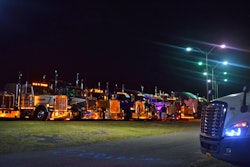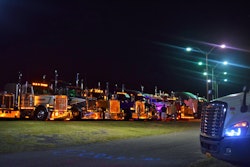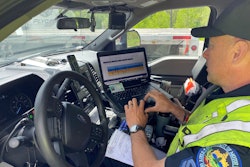 State-to-state harmonization challenges persist for specialized carriers, and new to the mix in recent years are priorities placed on advocating for hours of service flexibilities. That's one of the messages that came out of a panel discussion March 1 moderated by (right) Oxbo's Keith Settle with (from left) Jennifer Schuster of Edwards Moving and Rigging; Intermountain's Ron Montgomery; Brett Berard of Berard Transport; Precision Specialized's Ed Bernard; and Bennett CEO David Lowry.
State-to-state harmonization challenges persist for specialized carriers, and new to the mix in recent years are priorities placed on advocating for hours of service flexibilities. That's one of the messages that came out of a panel discussion March 1 moderated by (right) Oxbo's Keith Settle with (from left) Jennifer Schuster of Edwards Moving and Rigging; Intermountain's Ron Montgomery; Brett Berard of Berard Transport; Precision Specialized's Ed Bernard; and Bennett CEO David Lowry.
The hours of service regulations have been a perennial hot topic of debate among owner-operators and other drivers for decades now. Since the dawn of the electronic logging device mandate in late 2017, that debate has only heated up, branching into most every trucking segment and leading the way toward changes designed to increase split-rest flexibility in 2020, among other tweaks. But at last week's Specialized Transportation Symposium in Orlando, Florida, a meeting of the transport-focused members of the Specialized Carriers and Rigging Association (SCRA), heavy-specialized carrier execs noted continued challenges associated with operators' available hours, particularly when it comes to so-called "super loads" requiring intricate planning, extensive permitting and often conflicting scheduling -- sometimes changing at the drop of a hat at any given state line.

Permitting harmonization between states has long been an advocacy project of the association, with much progress made in that regard over the 75 years SCRA's been in existence. Yet there are still times when a permitted load restricted to daylight-only travel arrives at a state border to find itself restricted to late-night-only movement on the other side. For Brett Berard, operations vice president with Louisiana-headquartered Berard Transport, it often feels like "we’ll never get to a point where it’s easy to [transport over] borders between states," and permitting authorities' indecisiveness in the planning process only complicates matters. "In one instance," he added, one such authority "made a change" in a day/night restriction with just a few weeks to spare on a complicated, intricate super load plan.
Berard was speaking as part of the opening panel discussion around specialized-transport challenges that began the symposium's education session on March 1.
Operators' hours of service in such a scenario can be particularly "tough to deal with," said Ron Montgomery of Intermountain Rigging and Heavy Haul, as planners struggle to get the right people in the right place, with the right amount of hours, to complete the most complex of moves within sometimes tight time frames on the permits. "ELDs have really impacted heavy haul," he added, foregrounding the hard duty limitations of the hours of service. In the run-up to implementation of the ELD mandate in 2017, SCRA requested and was granted an exemption from the requirement to take a 30-minute break after eight duty hours (since 2020 eight driving hours). That exemption came with regulators' recognition of the incompatibility of the requirement with operational challenges of finding a safe place to park with an oversize move, limitations with curfew hours particularly in wintertime, and more.
"We’re pretty safe" compared to the greater population of motor carriers, Montgomery added about heavy-specialized haulers on the whole. "Fatigue isn’t really much of an issue with heavy-haul loads." Hours of service rules as they are, he felt, "have made our industry's [work] tough to officially do."
[Related: ELDs and highway safety: Crashes, injuries, fatalities rise post-mandate]
At the symposium, panel moderator and Oxbo Mega Transport Solutions CEO Keith Settle echoed Montgomery, and others in the room, in the feeling that current hours regulations, furthermore, "make it tough on folks who do it right" in terms of compliance and safety, suggesting a need for greater enforcement in other segments of the industry rather than what seems to have been the Federal Motor Carrier Safety Administration's modus operandi over two decades now. "What good is a rule," he said, "if nobody checks" that you're following it. FMCSA just keeps piling on "regulations for the people who are doing it the right way" to follow.
Jennifer Schuster, with Kentucky-based Edwards Moving and Rigging, wondered whether regulators might ever be persuaded to create distinctive treatments under the hours of service for super loads and other oversize/overweight moves. "When you lump trucking and put us all together you miss the nuances of what we do and the different types of trucks" and operations, she said.
"Why not have a regulation for those super-load drivers" distinct from garden-variety hours? asked Settle, noting also that individual states have definitions for just what qualifies as a super load in their own rules.
Outside the exemption-request process, FMCSA appears to have little appetite for such an approach to the hours of service, though owner-operators and others for years have suggested a variety of potential carve-outs -- hours flexibilities tied to experience, to safety performance, indeed dependent on the freight niche. In some sense, SCRA has been there, too, with strong recommendations ahead of the 2020 HOS changes that FMCSA allow 6/4- and 5/5-hour split-sleeper options, something many owner-operators have long advocated/wished for themselves.
[Related: While many support owner-op's HOS exemption request, opponents mount challenge]
Yet potential further tweaks in the hours of service have taken a back seat to other concerns under the Biden administration. Current FMCSA Administrator Robin Hutcheson acknowledged as much in September, when she noted that "we’re not looking at further changes" to hours. She was responding to Overdrive queries about the years many in trucking operated under an hours of service waiver during the COVID pandemic, and whether safety outcomes for those businesses might generate arguments for increased hours flexibilities.
FMCSA officials speaking on background just this week underscored that no such comprehensive analysis of safety outcomes had been completed, and further carve-outs for specific types of moves just weren't on the table at the agency at this point.
For specialized carriers, suggested David Lowry, CEO of Bennett Motor Express and a past president of the association, the issue of adequate enforcement prioritization over any additional regulations could well be the bigger issue. Speaking at the symposium, he noted enforcement should ramp up "the pressure on the bad guys out there. There are a lot of good carriers who suffer from a lot of things that have happened." He's seen "carriers coming into my state with 13 axles and no permit at all," for instance, he said. "Continuing to pour regulations on top of us without enforcement of the regs on the books" is no solution to the issues of safety he sees.
Difficulties for carriers doing it right, he said, will just continue "if things don’t change."










